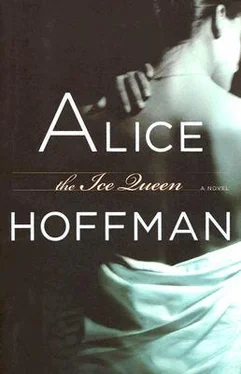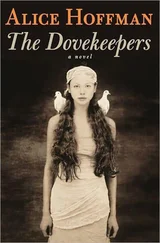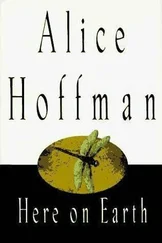“Look, Renny, even if it’s not Iris, someone will think you’re perfect the way you are.” He looked at me and I could tell, no matter what he might say, he still had hope. He wanted to believe. “Trust me,” I said.
“Maybe you’re right,” he said.
“You know it.”
I had almost convinced myself. Renny got out of the car and walked backward so he could wave to me.
“Monsters of the world, unite.” He raised his gloved fist in the air.
“Go study, or something,” I called to him.
He walked into his dorm. He was gone, but not completely. For there it was, still with me: Renny’s idea, replaying itself, getting bigger. What if Lazarus was hiding something? What if he was indeed a monster? The man I thought I knew could easily be a figment of my imagination, a bear, a snake, a spiny toad. The more I thought about it, the more I wondered. Was it possible to know anyone, truly? Could knowledge hurt, pierce your heart, break your bones?
Instead of going home, I drove to the library. To hell with human beings. I’d always felt safer with stories than with flesh and blood. I let myself in the back entranceway with my key, then locked the door behind me. It was hot and damp in the library; no wonder the pages of the older editions were turning brown. I switched on the desk lamp. A small circle of yellow light. Frances left the desk tidy and well organized, so I was careful not to displace anything. There was a peculiar heaviness in the room; during the day we kept the old air conditioner on, now the dust had settled. I coughed and the sound echoed.
Frances had photographs of nieces and nephews displayed, of a black dog called Harry, of the canals of Venice, where she’d vacationed last year. Beside my desk, nothing. Nothing obvious, at least. Just the invisible picture I always brought with me, the one of myself, the girl who stomped her feet on the porch, breath billowing out like smoke, little beast, long dark hair falling down her back, the stars in the black sky forever set in place, the ice forever shining, brighter than the stars.
I could hear beetles hitting against the screens in the windows. I heard a sigh, as though the books were breathing. I felt that this was where I belonged. This was where I lived. Everything else that had happened or would happen was a dream of some sort. Then I heard a thud. I took in my breath. A real live noise. That woke me up. Maybe I wanted to be alive, after all. Maybe I wanted to be in the world. I was afraid that a thief was trying to enter the library. Everything was free here; there was nothing to steal. Whoever was crazy enough to break in might also be crazy enough to do more.
I shrank back into the dark. There was a clanging then, and I breathed easier. Not a break-in, a return. I realized that someone had slipped a book through the night drop. Nothing more. I pinched myself for being an idiot and went to the door. Nothing to be afraid of. I could see someone dressed in white walking down the path. She was barefoot on the concrete. Her hair was pale and she was in a hurry. There was a car parked in the street, left running. The night was dark, black as beetles. I couldn’t make out any features until the car door opened and there was a flash of light. The woman was my sister-in-law.
I stood watching until the car disappeared. My heart was pounding. Too fast. Too hard. I had spent my life feeling as though I were an accomplice to a crime. It was nothing new to me. Death-wisher, betrayer, liar, secret-keeper. I was death’s assistant, with no great skill of my own. A lackey, a fool, the helpmate whose every move had resulted in tragedy. One step, one wish, one mistake, one icy night. And now I had seen my sister-in-law, Nina, rushing to her car, driving off into the dark. I realized the white thing she was wearing was her nightgown.
The book she’d left was in the night-drop bin; when I picked it up it was still warm from her touch. I took the book with me, out the back door, where my car was parked in the shadows. I drove back through the campus, and it was probably no accident that I wound up on my brother’s street. Maybe I wanted to be reassured that it hadn’t been Nina at the library, only someone who looked like her. I could see into some of the houses, filled with yellow light, with life. My brother’s house, however, was dark. Everyone asleep. Everyone safe inside. The car I’d seen at the library was parked in the driveway. Maybe she hadn’t driven it tonight; all the same, I wasn’t sure I wanted to know. I didn’t dare get out and touch the hood of the car to see if it was still warm.
There was a streetlight above me; when I flipped over the book that had been returned I saw the title: A Hundred Ways to Die. It was the instruction manual for suicide I’d often referred to in New Jersey when Jack Lyons phoned me for information. I felt something close up in my throat. I’d thought that like always recognized like, but it seemed I’d been completely mistaken about Nina.
I watched the beetles fly through the dark above their lawn. I wondered if Nina had reached home and had crawled into bed beside my brother, if he hadn’t even noticed she’d been gone, noticed her pale feet were cold. Now I remembered that the day before my mother died, my brother had spent all day making her a present. It was a book made of construction paper, bound with shoelaces. When I’d asked him what it was, he’d said it was the story of his life. That’s stupid, I’d said. I didn’t look at his face to see if I’d hurt him. Who cares about that? I was jealous. I knew a book could make something real. In this case, it was his love right there on that paper, tied with laces, given over freely to our mother. That’s why I’d been so mean to Ned. I had nothing. I hadn’t even thought to give her a present. I hadn’t thought at all.
The house we’d lived in in New Jersey could have easily fit into the living room of the house where my brother lived now. It was a beautiful structure, even in the dark. Before tonight I had imagined that Ned and Nina slept well at night, logical sleep, dreamless and sweet. Now I looked through the shadows to see there was a woman on the lawn. My brother’s wife. In her nightgown she was almost invisible. But she was there. It was Nina. She didn’t move at all. I tried to get away quickly, before she could see me. I began to drive away, headlights switched off. Maybe this had never happened, maybe I’d been all wrong, but when I turned to look out the rear window I saw that she had spied me, not that she seemed to care. She looked right through me, as if this world no longer concerned her, as if everything that mattered could no longer be seen with the naked eye.
People hide their truest natures. I understood that; I even applauded it. What sort of world would it be if people bled all over the sidewalks, if they wept under trees, smacked whomever they despised, kissed strangers, revealed themselves? Keep a cloak, that was fine, the thing to do; present a disguise, the outside you, the one you want people to believe. My sister-in-law was a perfect example: the sunny, near-perfect mathematician who drove through the quiet streets in her nightgown when most good people were in bed, who studied the hundred ways to die. I had already decided I wouldn’t mention the fact that I’d seen her at the book deposit. A liar like all the rest, ready to pretend I didn’t know about the crack in the reality of her life, the dark hour, the library door, the book of sorrow in her hands.
Absinthe, that’s how it began — ingested, of course. Anemia caused by refusing all food, anonymity, arsenic, asphyxiation, barbiturates (crumbled into puddings or applesauce to make for speedy digestion), bee stings (see wasps, see nests, see allergies), belladonna, black hellebore (brewed into a tea), cars (accident, asphyxiation), crucial arteries (knives, razors, ballpoint pens), death by drowning, falls from open windows (eighth floor or above), fire, gas ovens, gunshot wounds, hanging, heroin, death by ice, ivy (pulverized and made into soup or tea), jimsonweed, OxyContin, pennyroyal, plastic bag over the head (see double death, see ensuring overdose), poison hemlock, the root of pokeweed, ponds and lakes, death by provoked police incident (see car chase, public drunkenness, public nuisance), public restrooms, renting motel rooms, sedatives, standing in the wrong place at the wrong time, stimulants, death by wishes.
Читать дальше












